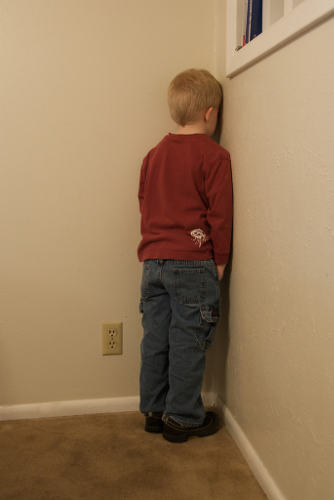
In recent years, many books have come to light that preach the efficacy of positive parenting and "no drama". This creates confusion for many parents, especially when their environment continues to use the punishment with their children even if they prefer not to (starting with school) or when they do not know what to do to get what they want without threats and retaliation. In this context, at the 123rd Annual Convention of the American Psychological Association specialists have explained that punishing a child is effective, as long as it is done in the right way.
I am sorry that my next comment is not politically correct, but surely for many this is nothing new. Now, what kind of punishment is effective in educating a child? As you will see below, experts consider what they know as punishment wait time. Let's see what the experts think.
Positive discipline vs. waiting times
At one of the convention symposia, Oklahoma State University researcher Robert Larzelere explained that positive discipline techniques used by parents can work. However, as this expert explains, Scientifically backed problem child parenting programs have found that wait times and other types of assertive tactics can work if they are managed correctly.
In her presentation, Larzelere said her research team interviewed 102 mothers who provided detailed descriptions of five occasions when they had to discipline their children when they beat or hit others, protested, challenged them, tried to negotiate, or did not listen.
Achieve compromises it was the most effective tactic for immediate behavior improvement, regardless of the type of behavior. Reasoning was the next most effective response when mothers were reacting mildly to annoying behaviors, such as bargaining or protesting.
The punishments, such as timeouts or taking something away, were more effective than reasoning when it came to a child who was acting challenging. However, punishment was the least effective tactic when dealing with child bargaining and whining, and reasoning was not effective when used with defiant or 'peggy' children.
But the long-term effects revealed a different pattern. When mothers were interviewed two months later, those who offered compromises too often to children who hit or hit a lot or act defiantly said their children were acting bad, Larzelere said. Reasoning, however, was most effective in time for these children, even though it was the least effective response immediately. Moderate use of time-outs and other punishments (less than 16% of the time) resulted in later improved behavior, but only for these defiant children.
Correct use of timeouts
In another presentation at the same symposium, Ennio Cipani, from the National University, said that the reason that timeouts do not work or are viewed negatively is because they are not used correctly. Cipani and her colleagues have been able to observe, in real time, the mistakes parents can make in applying time-out, Cipani said. For example, parents should not make decisions driven by the stimulus of the moment to use a time out. Rather, they should tell their children ahead of time what behaviors (eg hitting, yelling at other children) will put them on hold and always move on.
"Our clinical case findings have shown that time-out is consistently used for certain behaviors and situations, significantly reducing behavioral problems over time," Cipani said.
Child behavior therapy
Child behavior therapy can also help parents and children with ongoing conflict.according to David Reitman of Nova Southeastern University and Mark Roberts of Idaho State University. Roberts presented information on the Hanf method of parenting, based on the work of Constanza Hanf, which allows an initial stage of positive discipline (that is, children are rewarded for good behavior) and eventually moves into parenting techniques. more authoritative (ie timeout).
According to Roberts, Allowing the child a second chance to comply with parental instructions by offering a warning for noncompliance has proven beneficial. According to this specialist, over time parents learn to give instructions and warnings more effectively, reducing the need for waiting time in case of non-compliance.
Reitman suggested that parents of typically developing children may view behavior therapy as just punishment, but as something that has broad value in promoting positive child development.
Reitman explained that people who are critical of the therapists' actions do not understand their efforts to convey to parents the value of positive connection with their child.. "Therapists can help parents understand the problem, facilitate changes in the environment, and help children acquire the skills they need to be successful," He explained.
Images - Carl Larsson, Ken wilcox, 0 | (healthy

